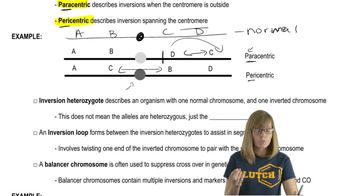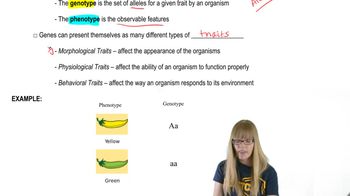Here are the essential concepts you must grasp in order to answer the question correctly.
Chromosomal Inversion
A chromosomal inversion occurs when a segment of a chromosome is reversed end to end. This can disrupt gene function and may lead to abnormal phenotypes, especially if the inversion affects critical genes. In this case, the husband's chromosome 1 has a significant inversion, which could impact the genetic stability of gametes and increase the risk of abnormalities in offspring.
Recommended video:
Karyotype Analysis
Karyotype analysis is a laboratory technique that examines the number and structure of chromosomes in an individual's cells. It helps identify chromosomal abnormalities, such as aneuploidy or structural changes like inversions. In this scenario, the normal karyotype of 46 chromosomes indicates no major numerical abnormalities, but the presence of an inversion on chromosome 1 raises concerns about potential genetic risks for future children.
Recommended video:
Genetic Counseling
Genetic counseling is a process that provides individuals or couples with information about genetic conditions and the risks of inheritance. It is particularly important for families with a history of genetic disorders or abnormalities. In this case, the wife's suggestion to seek genetic counseling is crucial, as it can help them understand the implications of the husband's chromosomal inversion and assess the probability of having children with genetic abnormalities.
Recommended video:






